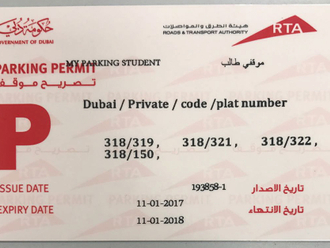Abu Dhabi: The Emirates Centre for Strategic Studies and Research (ECSSR) organised a lecture entitled “The World Today: A Conversation with Nicolas Sarkozy,” delivered on Wednesday by the former President of the French Republic, Nicolas Sarkozy.
Sarkozy started his speech by thanking the ECSSR and its Director General, Dr Jamal Sanad Al Suwaidi, for inviting him to deliver this lecture at this critical time. He praised the prominent role of the Centre as a scholarly and research institution that plays a leading role regionally and globally. He also expressed his appreciation of Dr Jamal Sanad Al-Suwaidi, who shares “your leaders’ vision to achieve a balance between openness to modernity and maintaining tradition, without sacrificing adherence to the tolerant teachings of Islam.” He added: “It is my great honor to be your guest. I have admired your country for a long time. I believe in this country; this is not mere words and sayings, but rather facts and evidence.”
Sarkozy talked about the experience of founding, with His Highness Shaikh Mohammad Bin Zayed Al Nahyan, Abu Dhabi Crown Prince and Deputy Supreme Commander of the UAE Armed Forces, the Paris-Sorbonne University Abu Dhabi and the Louvre Abu Dhabi. He also discussed the establishment of a French military base in Abu Dhabi, which he considers a great achievement; as it was the first French base established outside French borders since the end of World War II.
He commented on this by saying: “I took that decision because mere friendly rhetoric about strategic relations will not be enough; there must be practical and live proofs and evidence for such [rhetoric]. The UAE, under its wise leadership and the insightful vision of Shaikh Mohammad, proved that it is the country to establish a constructive and fruitful partnership with, and that it is able to achieve what other countries had failed to; that is to reconcile identity and modernity, and to remain loyal to Islam and open to the world cultures.”
He stressed that this “represents a message of hope from the UAE not only to the Arab world, but rather to the whole world.”
Sarkozy spoke about the challenges facing the Middle East. He said the region is experiencing crucial and profound transformations, with implications for everyone, and that the major challenge lies in maintaining the diversity of the Middle East. He added: “It is true that the desire to spread democracy everywhere is important, but I think that diversity is more important; as the East is strong with its diversity.”
He cited the words of General Charles de Gaulle: “I flew with simple ideas to the complicated East; that is the wealth of diversity.” He added: “You are facing two challenges: the first is confrontation between the Sunnis and Shiites, which is a source of concern for your friends.” The second challenge to which President Sarkozy referred was that posed by terrorist and extremist groups.
He said that “the majority of Muslims live their faith in peace, versus a minority that distorts Islam.’” He added that people are suffering from the terrorism practiced by that extremist group.
Sarkozy also referred to Iran as a source of concern for the region and the world. He categorically rejected a nuclear-armed Iran. “A nuclear-armed Iran is simply unacceptable and undebatable; an Iranian nuclear weapon would prompt other regional countries, such as Turkey and Saudi Arabia, to acquire nuclear weapons capability. This will lead to the proliferation of nuclear weapons in the region. Just imagine what would be the region if this had happened.”
Sarkozy also said that the nuclear agreement reached with Iran left a lot of gray areas, and that its credibility will depend on the level of control, and the degree to which the Iranians adhere to the deal. He called on them to prove their good faith through the full implementation of the nuclear deal. Sarkozy also referred to the negative role of Iran in the region, particularly in Bahrain, Syria and Yemen.
In terms of the Syrian crisis, Sarkozy said that it is necessary to find a solution as soon as possible in order to provide relief to the traumatized populace. He referred to the Madaya tragedy as an example of the suffering of Syrians. He added that the Syrian crisis is complex because it is a meeting point of two wars: the first between Sunnis and Shiites, and the second a confrontation with the dark forces. Much time has been wasted, he said. Sarkozy pointed out that as president, in the summer of 2012, he called for urgent international action, at a time when the moderate Syrian opposition parties were powerful and ISIS didn’t exist.
Sarkozy said Bashar al-Assad is an obstructive element, as he is responsible for an estimated 250,000 deaths in Syria, and cannot be allowed to build the future of Syria. The Syrian reconciliation can’t be achieved in the presence of a person who kills his own people, Sarkozy said, so he has to leave. However, he indicated that it is important to organize the framework of his departure, and not to repeat the mistakes made in Iraq, where the Baath party was uprooted immediately after the overthrow of Saddam Hussein in Iraq. “You have to deal with individuals who worked at the heart of the regime,” Sarkozy said. He called for open communications with Russia to find a political solution to the crisis, and noted that Iran may also be interested in a gradual transition in Syria.
On the other hand, Sarkozy said that it is necessary to find a political solution to the Yemeni crisis. He said that the beginnings of peace talks in the Yemeni case must succeed, as civilians have suffered greatly and terrorists groups such as ISIS and al Qaeda are benefitting from the continued chaos in Yemen.
Sarkozy said that it is necessary to unite in the fight against terrorists and jihadists, who have declared war on both the Islamic community and the West. He pointed to the bloody attacks in Paris, saying: “We have to win the war against them; there is no room for trembling hands; everything is at stake. We must fight the war until the end.”
Sarkozy stressed that this war can’t be won without the participation of Muslims. He praised the UAE’s role, saying, “The Emirati leadership knew that any small confusion would have repercussions.” He praised the Saudi Arabian declaration of a military Islamic coalition of 34 countries, with the support of the United Arab Emirates. He addressed the need to translate this coalition into concrete action to eradicate ISIS and other Jihadists. Sarkozy said that ground troops should be deployed to face the extremists, but that the troops must come from Arab countries, with the support of the international community.
Sarkozy expressed concerns about what is happening in Tunisia: “As a Frenchman, I put the stability of Tunisia, Syria and Libya at the forefront of our priorities. The collapse of the southern littoral states of the Mediterranean will have serious ramifications on the north; the failure of the south cast a shadow over the north.”
In conclusion, the former French president stressed the need to unify East and West against extremists, and to work together in order to achieve stability and find common ground, based on multiculturalism, peaceful coexistence, and tolerance among all sects and components.
The lecture was attended by a huge crowd, including Shaikh Faisal Bin Saqr Al Qasimi, Chairman of Gulf Pharmaceutical Industries (Julphar); Dr Jamal Sanad Al Suwaidi, Director General of the ECSSR; the ambassadors of a number of foreign and Arab countries in the UAE; senior officers of the armed forces; and a large group of diplomats, intellectuals, academics and researchers.






